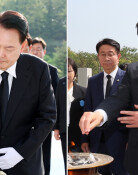‘Hastily arranged diplomatic meeting before Trump’s inauguration
‘Hastily arranged diplomatic meeting before Trump’s inauguration
Posted January. 17, 2017 07:04,
Updated January. 17, 2017 07:14
Acting President Hwang Kyo-ahn urgently called Monday Korean ambassadors to the U.S., Japan, China and Russia, the four powers surrounding the country, and Korean mission to the United Nations, and held a meeting to review geopolitical situations in Northeast Asia and the Korean Peninsula and discuss countermeasures. Amid fierce moves to reshuffle strategic ties between the U.S. and Japan, and three-way relations between the U.S., China and Japan since the election of Donald Trump who is calling for “America First,” Hwang stressed the continuity of diplomatic policies, including the deployment of the Terminal High Altitude Area Defense system in Korea and the Seoul-Tokyo agreement on Japan’s comfort women.
Under the Park Geun-hye administration since 2013, it was the first urgent meeting that all ambassadors to the four powers participated. The meeting must have been called apparently due to a sense of crisis that geopolitical situations surrounding the Korean Peninsula are evolving in a serious direction, but the statements that Hwang made at the meeting seem to be overly complacent and light. Despite importance of the consistency in diplomatic policy, the government needs to strategically seek the maximization of its national interest in times when international political situation rapidly changes. Sudden changes in global order have been widely predicted since Donald Trump’s election as U.S. president, but how the Korean administration is calling an urgent meeting by calling its ambassadors to the four powers now, just three days ahead of Trump’s inauguration?
South Korea, which is currently calling for “policy consistency,” has been labeled by China as the “weakest link” in three-way security cooperation between South Korea, the U.S. and Japan, and has been under attack due to its planned THAAD deployment. It is also urgently needed that Seoul conveys its stance on defense cost sharing and North Korean nuclear issues to the incoming U.S. administration. “Our diplomacy should not fear new challenges and changes at the heart of a turning point that new seismic shift is starting in earnest, and instead should preemptively cope with them,” Foreign Minister Yun Byung-se said. He is right. But if he is a minister not a diplomacy commentator, he should have stated what and how Seoul will preemptively and strategically cope with.
If Trump’s reconsideration of “One China policy” actually materializes, comprehensive readjustment of Washington-Beijing relations will also be inevitable. Korea should have seriously sought different approaches for respective scenarios as to how Seoul will cope with if the Trump administration pursues “reverse Nixon Doctrine” aimed at isolating Beijing through Washington-Moscow ties, or if Japan positions itself as Washington’s security partner by citing the theory of Chinese and North Korean threats. As Foreign Minister Yun has failed to properly play his roles, even an employee at the Korean mission to Taiwan unfaithfully responded to a report by Korean women who had been raped by a Taipei taxi driver.







